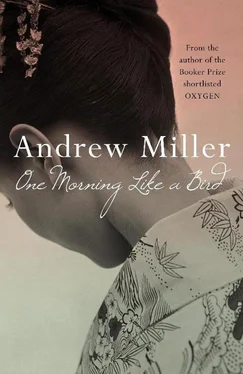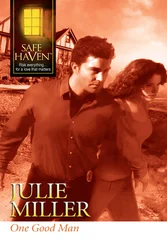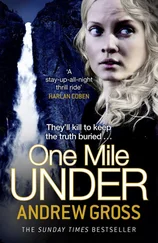At night they burn like candle flames
But the days must be difficult —
Hearing children on the way to school,
Hearing the thrum of kite strings.
At the song of the red-hot-pepper vendor
Even a dead tongue burns .
There he stops, for though the poem has another four lines, there are tears falling onto the backs of his hands. He can no longer speak.
He finds Makiyama in a bar by Shibuya Station drinking beer with his assistants, Ito and Kiyooka. It’s four in the afternoon. At six they move to Sukiyabashi and start on the sake, then to the Black Pearl on the Ginza and finally through the stained-glass doors of the Don Juan, where they take one of the booths by the dance floor and Makiyama buys a bottle of whisky. A tango band is playing. The singer, in his white tuxedo, sighs into the microphone. Between the pillars, clouds of cigarette smoke shift in the breeze from a ceiling fan.
Sweating from the drink, Makiyama undoes the top button of his shirt, hangs his hat on his knee, and pulls the cork from the bottle. He’s thirty-five or thirty-six, dressed in a new suit of lime-green serge, a pair of tan and cream spats on his feet. In his jacket lapel he has a pin, a curious pin with a head of red glass, perhaps even a ruby. Does it mean something?
A waitress takes the seat beside him and starts to feed him peanuts, sweet-bean paste. On the other side of the booth, Ito and Kiyooka are watching the dancing, their heads moving in unison like a pair of Siamese cats in the window of a hairdresser’s shop.
Yuji hasn’t drunk like this for months. Beer, sake, whisky. The effort of keeping up, of being congenial, of remembering why he’s there at all, is starting to exhaust him. He has extracted no promises, nothing but a few vague and lordly assurances that may already have been forgotten. He sips from his glass and listens to Makiyama trying to impress the waitress with his wealth of connections, though it’s obvious she has never heard of any of them. Only when he mentions the pulp writer Kaoru Ishihara does she show any genuine interest.
‘Ishihara, eh?’
‘An old friend of mine. You could even call me a kind of mentor.’
‘Really! But it must be nice,’ she says, dropping another peanut into his mouth, ‘to know someone like Ishihara.’
He grins at her, then pushes her away and turns to Yuji. He has, he says, grinding the nut between his large yellow teeth, just had another of his celebrated intuitions. ‘Come closer,’ he says. ‘Lean closer.’
Hideo Makiyama’s story is a Low City story, his success a Low City success. No one seems quite sure of where he comes from — Honjo, perhaps, or Asakusa, or even somewhere out of town, some unlikely little place only the slow trains stop at. Has he attended university? Has he attended much high school ? He seems to Yuji a man who would struggle to write a thank-you letter, and no more of an intellectual than Miyo. His talent — if talent is the right word — is of a different order entirely, simpler, much more lucrative, for behind the shine of his brow, his slick moustache, he possesses a gift of insight into the appetites of the crowd, their vanities, their fears, the strange fastidiousness of their obsessions, their fickleness, their love of novelty. He would have done as well in the dry-goods sector, or selling cars, or women’s fashion, except that literature offered a certain status, a certain respectability, though one that did not at all prohibit him from passing the working day in a Ginza beer hall. He has no prejudices. High art or low, he doesn’t care. Nor is he burdened by tradition, for he knows nothing of it. His questions are so simple, so childlike, so unapologetic, some of the older writers (who thought their reputations safe) live in terror of him. Will it sell? How many? To whom? What will the margins be? The percentages? The profit share? You cannot catch him out. His memory for numbers — monthly circulations, print runs — is unfailing. He knows (for example) that only thirty-seven copies of Electric Dragonfly were ever sold and this, at five per cent of two yen per copy, represented an income of three yen and seventy sen, a contemptible sum even by the miserable standards of the genre. A head for numbers is starting to make him wealthy. Numbers, and a snout like those dogs one sees foraging in the spilt bins behind restaurants.
At midnight the band starts to pack away their instruments. The dancers-for-hire sit down and rub their aching calves. The waitresses are tired too. They move from booth to booth collecting bills, their sandals scuffing the wooden floor. Startling from a short sleep, Makiyama drops a banknote on the table, crams his hat on his head, and strides down to the Ginza Crossing, where he stops a one-yen taxi by stepping in front of it and spreading his arms. They squeeze, all four of them, into the back. Makiyama calls an address to the driver, who seems to know it. They jolt forwards, cruise awhile under the lights of the Ginza, then turn up towards the park and into the darker, emptier streets around the government buildings.
As they travel, and the wind stirs the litter from the night-stalls, Makiyama starts to sing. It’s the lovers-parting-in-the-dawn-mist song from a new musical he’s invested in at the Moulin Rouge in Shinjuku. Then he breaks off and says it’s a shame, a damned shame what they did to your father. Writing a few lines about the Emperor — what was it? Fifteen years ago? — really came back to kick him in the teeth, eh? It was tough. It was damned tough. But certain things just couldn’t be allowed any more, and if the people at the top didn’t set an example, what could you expect from the riff-raff? It wasn’t personal. Just a question of discipline, of being ready for what was coming, of showing the world that Japan meant business. Even so, yes, he was sorry for what had happened, genuinely sorry for the Takano family’s misfortune.
Yuji, trapped against the car door, bows as best he can. The speech has surprised him. He is also surprised at how grateful he feels, though it’s inconceivable that Makiyama has ever read the 482 pages of Democratic Principles and the Japanese Constitution , or has the slightest real grasp of Father’s arguments. The same, of course, could be said about most of the others, those whose muttering — or in some cases shrieking, hysterical shrieking — made, in the end, Father’s situation intolerable. And now that they have pulled him down, they will, perhaps, like Makiyama, begin to pity him, so that in a few years it will appear he fell through something as natural and implacable as bad luck, his enemies nothing more than bystanders, innocent witnesses to an event they could not possibly have altered the outcome of.
They stop at the mouth of a stone-paved alley somewhere in Sanbancho. The neighbourhood is poorly lit. The houses have their eaves pulled low, like caps. The alley is so narrow they have to go in single file. At the end, there is a little shrine to the fox god. A woman is praying there, but hearing the men, she lifts the hems of her kimono and hurries, on wooden soles, through a doorway where a lantern marked with the characters for falling leaves swings its crimson light in the wind.
They follow her inside. Makiyama shouts for service. The hostess of the house appears, trotting out of her booth and calling a welcome. Recognising Makiyama, telling him how well he’s looking, how prosperous, she leads them up the stairs and along a corridor to a room at the back of the house. From the tobacco haze, the smell of fish, it’s evident the room has only recently been vacated. A maid appears and straightens out the sitting cushions, polishes the table. Yuji slips the catch on the window. There’s a courtyard below with a few shrubs, a line of sake kegs outside the open doorway of the kitchen. On the far side of the courtyard, where shadows blur and focus behind the paper windows, a girl’s voice is singing to the accompaniment of a shamisen : ‘Yes, I am in love. They were talking about me before daylight . . though I began to love without knowing it . .’
Читать дальше












